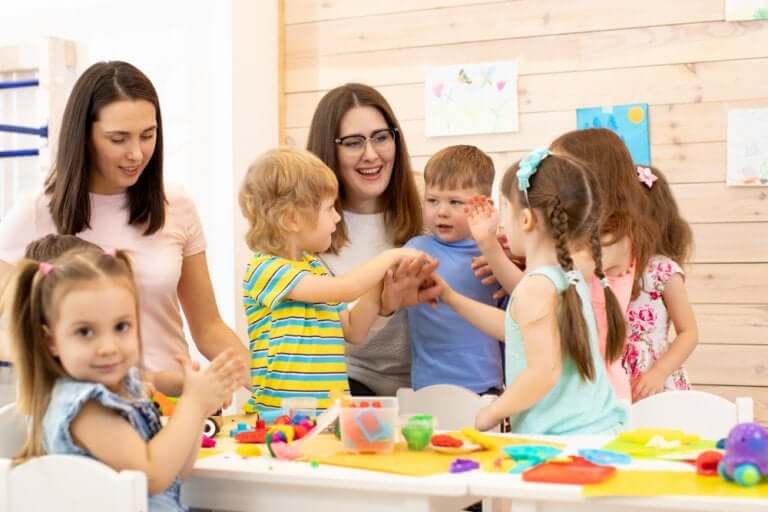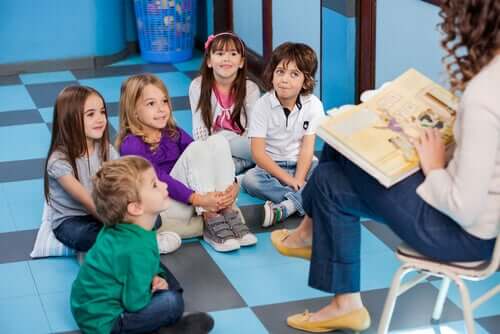Basic Educational Needs in a Child's Early Years


Written and verified by the pedagogue and trainer María Matilde
Covering basic needs in a child’s education is absolutely essential for their proper development. Basic educational needs, as the name suggests, are vital requirements that must be attended to.
This is to ensure that a child’s physical, psychological, social and emotional development occurs correctly, along with the correct shaping of their personalities.
Basic educational needs for a child
The infant education stage spans from birth to 6 years of age, and is comprised of two cycles. The first cycle is from 0 to 3 years of age, and the second from 3 to 6 years of age.
This is a fundamental period in a child’s growth. It’s their first point of learning – their first contact with the world and with other people.

However, in each of these educational cycles, the basic needs will depend on the age group the children find themselves in. Thus, between the ages of 0 and 3 years, they’ll mainly be related to their basic needs for food, hygiene and rest.
Food
This is one of our most basic needs. It needs to be completed in an adequate way as a condition for the child to be allowed to carry out other activities.
In this sense, teachers should create a link between the school and the parents. They need to get to know the children’s feeding needs. They also need to know if they’re bottle-fed or if they still take breast milk. Along with that, there’ll be other particular needs they’ll need to get to know.
Sleep
Rest is essential for children and should take place according to the needs of each child. Sleeping hours vary greatly among them. Each child has his or her own sleeping rhythm and generally needs to rest after each meal.
In addition, children should have a quiet place to rest. There should be low light and little noise in order to give them a really beneficial sleep.
Hygiene
Teachers should strive to attend to their children’s hygiene needs. They should also attempt to pass on these healthy hygiene habits to them. For example, when they become more independent and start to go to the bathroom by themselves, then they should learn to wash their hands. Teaching them to brush their teeth is another important healthy habit to teach them.

Daily activities to cover a child’s basic educational needs
The daily activities that teachers carry out to cover basic needs such as sleep, food and hygiene are the central points around which a child’s infant education is developed.
These are the first activities that children will learn within the school environment. As they repeat these activities on a daily basis, they get to know the routines. After a while, they’ll develop autonomous habits.
At the same time, children begin to develop fine and gross motor skills, sensory skills, and language development. In addition, they’re also learn, little by little, to relate to their environment, both physically, socially, and emotionally.
Daily activities and affection
As we’ve been saying, it’s essential that we attend to a child’s basic needs. We should also bear in mind that these will change as they go through their corresponding stages of development.
In addition, all daily activities related to the satisfaction of basic needs that a teacher carries out within the classroom includes a permanent interaction between the child and the teacher.
In this way, a loving bond is created between the teacher and their children. This is also essential in order to develop feelings of security and love in the children.
The teacher’s involvement in carrying out these basic needs means that they’ll need to create adequate conditions for the child to develop correctly. This isn’t only so that the children will get used to the routines necessary for their lives. It’s also so that they’ll develop basic loving bonds for their emotional and social development.
Giving a child food, changing a diaper, or singing a lullaby to help them fall asleep are daily activities that aim to cover their basic needs. However, it’s also a matter of providing them with love and support, something that’s vital for their future growth.
Other basic needs in children’s education
We’ve referred a lot to a child’s basic needs in the first cycle of their education – needs such as food, hygiene, sleep, love, and emotional support.
However, we mustn’t forget that other basic needs arise as the children grow up. We’re talking here about physical activity, sensory, cognitive and linguistic stimulation, socialization, and play. Teachers and parents will need to cover these needs too, once the most basic ones have been met.
Covering basic needs in a child’s education is absolutely essential for their proper development. Basic educational needs, as the name suggests, are vital requirements that must be attended to.
This is to ensure that a child’s physical, psychological, social and emotional development occurs correctly, along with the correct shaping of their personalities.
Basic educational needs for a child
The infant education stage spans from birth to 6 years of age, and is comprised of two cycles. The first cycle is from 0 to 3 years of age, and the second from 3 to 6 years of age.
This is a fundamental period in a child’s growth. It’s their first point of learning – their first contact with the world and with other people.

However, in each of these educational cycles, the basic needs will depend on the age group the children find themselves in. Thus, between the ages of 0 and 3 years, they’ll mainly be related to their basic needs for food, hygiene and rest.
Food
This is one of our most basic needs. It needs to be completed in an adequate way as a condition for the child to be allowed to carry out other activities.
In this sense, teachers should create a link between the school and the parents. They need to get to know the children’s feeding needs. They also need to know if they’re bottle-fed or if they still take breast milk. Along with that, there’ll be other particular needs they’ll need to get to know.
Sleep
Rest is essential for children and should take place according to the needs of each child. Sleeping hours vary greatly among them. Each child has his or her own sleeping rhythm and generally needs to rest after each meal.
In addition, children should have a quiet place to rest. There should be low light and little noise in order to give them a really beneficial sleep.
Hygiene
Teachers should strive to attend to their children’s hygiene needs. They should also attempt to pass on these healthy hygiene habits to them. For example, when they become more independent and start to go to the bathroom by themselves, then they should learn to wash their hands. Teaching them to brush their teeth is another important healthy habit to teach them.

Daily activities to cover a child’s basic educational needs
The daily activities that teachers carry out to cover basic needs such as sleep, food and hygiene are the central points around which a child’s infant education is developed.
These are the first activities that children will learn within the school environment. As they repeat these activities on a daily basis, they get to know the routines. After a while, they’ll develop autonomous habits.
At the same time, children begin to develop fine and gross motor skills, sensory skills, and language development. In addition, they’re also learn, little by little, to relate to their environment, both physically, socially, and emotionally.
Daily activities and affection
As we’ve been saying, it’s essential that we attend to a child’s basic needs. We should also bear in mind that these will change as they go through their corresponding stages of development.
In addition, all daily activities related to the satisfaction of basic needs that a teacher carries out within the classroom includes a permanent interaction between the child and the teacher.
In this way, a loving bond is created between the teacher and their children. This is also essential in order to develop feelings of security and love in the children.
The teacher’s involvement in carrying out these basic needs means that they’ll need to create adequate conditions for the child to develop correctly. This isn’t only so that the children will get used to the routines necessary for their lives. It’s also so that they’ll develop basic loving bonds for their emotional and social development.
Giving a child food, changing a diaper, or singing a lullaby to help them fall asleep are daily activities that aim to cover their basic needs. However, it’s also a matter of providing them with love and support, something that’s vital for their future growth.
Other basic needs in children’s education
We’ve referred a lot to a child’s basic needs in the first cycle of their education – needs such as food, hygiene, sleep, love, and emotional support.
However, we mustn’t forget that other basic needs arise as the children grow up. We’re talking here about physical activity, sensory, cognitive and linguistic stimulation, socialization, and play. Teachers and parents will need to cover these needs too, once the most basic ones have been met.
All cited sources were thoroughly reviewed by our team to ensure their quality, reliability, currency, and validity. The bibliography of this article was considered reliable and of academic or scientific accuracy.
- del Estado, B.O. (2008). Orden ECI/3960/2007, de 19 de diciembre, por la que se establece el currículo y se regula la ordenación de la educación infantil. https://www.boe.es/boe/dias/2008/01/05/pdfs/A01016-01036.pdf
- Berry Brazelton, T. (2005). Las necesidades básicas de la infancia. Editorial Grao. Barcelona.
This text is provided for informational purposes only and does not replace consultation with a professional. If in doubt, consult your specialist.








